Viking descendants
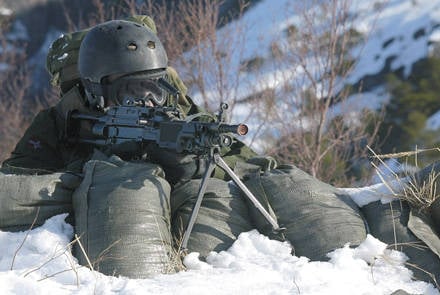 The nature of Norway’s direct threats and its vital national interests changed after the end of the Cold War. Currently, security is aimed at preserving the territorial integrity of the state and protecting against external threats. Therefore, the Norwegian government decided on the participation of the country's armed forces in multinational operations that are vital to the national interests of this Scandinavian country. In one of his speeches, the Norwegian Defense Minister stressed that the Norwegian special operations forces (NORSOF) will continue to play an important role in future multinational conflicts outside the country.
The nature of Norway’s direct threats and its vital national interests changed after the end of the Cold War. Currently, security is aimed at preserving the territorial integrity of the state and protecting against external threats. Therefore, the Norwegian government decided on the participation of the country's armed forces in multinational operations that are vital to the national interests of this Scandinavian country. In one of his speeches, the Norwegian Defense Minister stressed that the Norwegian special operations forces (NORSOF) will continue to play an important role in future multinational conflicts outside the country.Participation in hostilities in Afghanistan has given the target group of Norwegian special forces considerable experience, especially since it has contributed significantly to a number of special operations carried out by coalition forces. According to General John Wright, the Deputy Supreme Commander of the combined NATO forces in Europe, the task force of the Norwegian special forces operating in Kabul and the surrounding provinces has established itself from the best side. From March 2007 of the year — the moment it began its use — the group performed operational control tasks in the interests of the command of the international security forces (ISAF). The Norwegians have shown themselves to be strong professionals and have earned the great respect of both colleagues and senior commanders from ISAF.
Defensive strategy involves the preventive use of armed forces outside the country. In this regard, the Norwegian Defense Forces are a strategic tool for ensuring the security of the state.
Norway recognizes the world leadership of the United Nations in matters of the legal provision of peace, security and stability and believes that it is the only international organization capable of using the whole range of means and methods of conflict resolution. They include humanitarian, diplomatic, economic, informational and military means and methods used in accordance with the directives of the UN Security Council.
In addition, Norway is an active member of NATO. The fundamental principle of ensuring the collective security of the member countries of the alliance in attacking any of them is the guarantee of receiving support from the allies in the bloc. Norway also sees NATO as an important tool for supporting transatlantic security cooperation to ensure stability in the world in general and in the northern region in particular. Although Norway is not a member of the European Union, it cooperates and closely coordinates its activities with the European Defense Agency.
In addition, Scandinavian countries, the Netherlands, the United Kingdom and the United States of America are particularly important cooperation partners for Norway.
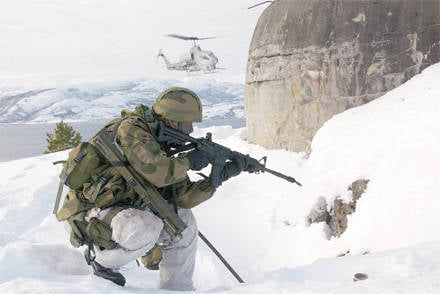 Creation and development of special forces
Creation and development of special forcesNorwegian special forces lead their history since the Second World War. At that time, small special units were formed in Great Britain that underwent comprehensive sabotage and reconnaissance training. The main tasks of these special divisions were to conduct special operations and sabotage on important infrastructure objects occupied by the Nazis in Norway, which are of great strategic importance. They managed to carry out a number of successful operations, among which the most important and effective is the raid and the destruction of the heavy water plant in Rükan. After World War II, special forces were disbanded.
Approximately 15 years later, the cold war between East and West, which caused an increase in tensions and external threats to Norway and NATO, led to the restoration of the Norwegian special forces.
The country's military leadership decided to form two relatively small special forces: Marinejegerlaget - on navy and Haerens Fallskjermjegerskole in the army. In connection with the threat of invasion of the Soviet Union and its allies, the main task of these units was to conduct deep intelligence. During the Cold War, both special forces gradually developed, increasing their combat potential and strength. Due to the increase in oil and gas production on the continental shelf and the increase in the construction of oil platforms in the North Sea in 1981, the counter-terrorism unit Forsvarets spesialkommando (FSK) was created as part of the army special forces unit (Haerens Jegerskole).
This new group was created in order to reliably protect Norway’s vulnerable oil platforms from the threat of terrorist acts. Therefore, special training special forces and its tasks until the mid-nineties were aimed almost exclusively at ensuring internal security.
In 1991, the Marine Special Forces Marinejegerlaget (MJL) was renamed Marinejegerkommandoen (MJK).
After the end of the Cold War, a discussion began about the place and role of special units in Norway. Despite the reform and optimization of many departments in the period 1993 – 2000. the reforms did not touch the special forces. Land special forces were not touched, because there were no other units in the country to combat the terrorist threat, and the naval special forces, because of their small number, had a very modest budget and did not allow for significant savings in military spending while reducing it. Therefore, special forces did not suffer, and even, on the contrary, during this period received a new development. After 1995, special forces, in addition to conducting internal operations, became involved in international operations. During the conflict in the Balkans, politicians decided to deploy special task forces of both special forces as part of multinational forces in the NATO area of responsibility outside the country. This has led to further strengthening the capabilities of the units, improving the organizational structure and training system to perform a range of special tasks.
Major transformations fell on 1997 year. This year, Norway's land special forces - Haerens Fallskjermjegerskole (HJS) was also renamed and became known as Haerens Jegerkommando (HJK). The number of permanent members of the unit was 90 people, but in the case of mobilization, it could be brought to 210 people. In the same year, the rangers headquarters were transferred to the army camp in Rene near Osterdalen.
In 1997, the number of Norwegian naval special forces by peacetime state was 40 people of a permanent composition and 160 people in wartime states.
The current abbreviation NORSOF, obtained with the abbreviation of Norwegian Special Operations Forces, which denotes a combination of land-based marine special forces, was first used during the operation in Afghanistan in 2001 – 2002.
In 2006, HJK was officially renamed Fosvarets Spesialkommando / Haerens Jegerkommando (FSK / HJK).
Over the past 15 years, Norwegian special forces have received a lot of support from the government of Norway. Due to this, NORSOF is currently capable of conducting the whole range of special operations, including the entire range of counterinsurgency (COIN) actions.
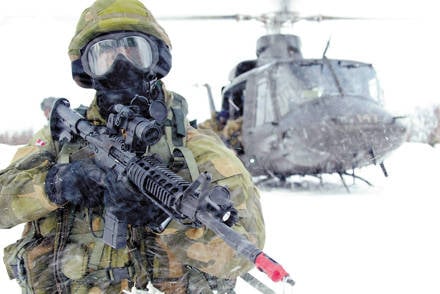 Structure of special forces
Structure of special forcesThe Norwegian special forces currently consist of three tactical units. This is the command of the special operations of the Norwegian Army (Norwegian Army Special Operations Commando - NORASOC), the command of the special operations of the Norwegian Navy (Norwegian Navy Special Operations Commando - NORNAVSOC) and the 137 air wing, formed as part of the Norwegian Air Force.
NORASOC is the largest division with a regimental structure.
It consists of a headquarters and several maneuverable squadrons. The regiment also includes a squadron of combat support services and a squadron of support services.
Its training wing is fully integrated into the regiment and is responsible for the basic training of operators and the improvement of their skills. In addition, NORASOC is still responsible for counter-terrorism tasks within the country. They focus on the implementation of a program to support the police and the Ministry of Justice to combat terrorism at sea.
The organizational structure of NORNAVSOC also includes maneuverable units, combat support services and logistics support services. During several operations in Afghanistan, NORNAVSOC, together with NORASOC, was part of a special-purpose tactical task force.
Aviation the special forces component is represented by the 137th air wing, which includes 12 transport helicopters. This specially trained helicopter unit is designed to support the special forces of the army and navy during special operations both on the territory of the country and abroad.
In peacetime, special units are subordinate to the relevant types of armed forces, which are responsible for providing resources and funding for these units. When it is necessary to use units during operations on the territory of Norway, the special forces come under operational control to the head of defense or to the commander of the national operational headquarters.
Tasks and their contents
There are five tasks for the Norwegian special forces: special reconnaissance and surveillance, offensive operations, military assistance, special aviation operations, and counter-terrorism operations.
Special intelligence and surveillance are conducted to collect high-value information, which is then used in the planning and decision-making process.
Offensive operations include raids and attacking actions with the use of fire impact. Such operations may also include fire support in the course of enemy fire resistance, which is carried out both from the ground and from the sea or from oil platforms.
Military assistance includes cooperation with allies or other friendly forces. It includes the deployment of guerrilla actions, training, support and, possibly, leadership of resistance or guerrilla forces. In addition, military assistance contributes greatly to a wide range of stabilization operations. These include activities for maintaining relations between the parties to the conflict.
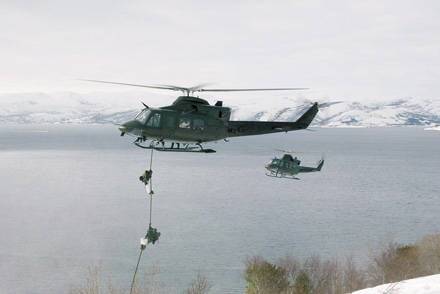 Special air operations are conducted by aviation units that are staffed with personnel who have undergone special training and are armed with special equipment. They can act independently or in conjunction with other parts. In the event of a shortage of resources, special air operations can also be conducted by conventional air offices.
Special air operations are conducted by aviation units that are staffed with personnel who have undergone special training and are armed with special equipment. They can act independently or in conjunction with other parts. In the event of a shortage of resources, special air operations can also be conducted by conventional air offices.Operations against terrorism are offensive in nature and are carried out in the national interests or the interests of the allies in order to reduce the vulnerability of their forces, personnel and property to terrorist attacks. They include the release of hostages.
One of the main current tasks of the Norwegian special forces is to maintain and develop their own capabilities in solving these problems. It will be of particular importance for achieving the maximum strategic and operational effect in future complex and unpredictable, including counterinsurgency, operations that require comprehensive military capabilities and considerable flexibility from special forces.
Experience of application
Based on the experience and knowledge gained from previous operations, the Norwegian special forces conducted a number of special operations. Before 2002, he participated in the NATO mission in Bosnia and Herzegovina, Kosovo and Macedonia. Since 2001, the special forces have been included in the forces participating in Operation Enduring Freedom and the NATO ISAF mission in Afghanistan.
During the period from 1995 to 2008, the Norwegian special forces gained a wealth of experience and learned many useful lessons. A small contingent took part in the operation in the Balkans, which made several combat exits, mainly for conducting special reconnaissance. After that, the units gradually improved their skills to participate in more complex activities. Due to the fact that the military and political leadership of Norway has increased funding for special forces, he was able to develop its capabilities, and now the NORSOF units are able to solve the whole range of special tasks anywhere at any time. This is exactly what the special task force currently deployed in Afghanistan is doing.
Some believed that after the first months of successful struggle against the Taliban, the desired victory would soon be achieved. This assessment was far from the true state of affairs. The West once again greatly underestimated the role of the local population. Therefore, during the deployment of the Norwegian special forces in Afghanistan in 2005, we had to admit that the rebel activities were growing and the local population was too scared and not ready to cooperate and interact with the ISAF troops. However, soon the emphasis in the conduct of hostilities was shifted from large-scale offensive operations towards the so-called counter-insurgency. Among other things, the task of nation-building was defined as one of the main tasks. Attracting public sympathy and assistance to the government of Afghanistan eventually became the focus of campaign leaders.
This conceptual shift showed that the tasks of providing military assistance became more important, as a result of which the support and training of the Afghan security forces was increased. The Allies also met with formal and informal leaders, enforced national elections and provided medical assistance to the local population.
All this has strengthened the confidence of the local population and ultimately inspired hope for a positive future. The lesson learned in carrying out these complex and demanding tasks was very useful for special forces, since it clearly showed that in order to achieve success, special forces units must be flexible and able to quickly redirect their activities. And the fact that the Norwegian special forces had good results was of great importance for the development of new opportunities in order to create a concept that will respond to future challenges in the fight against insurgents in an unpredictable world.
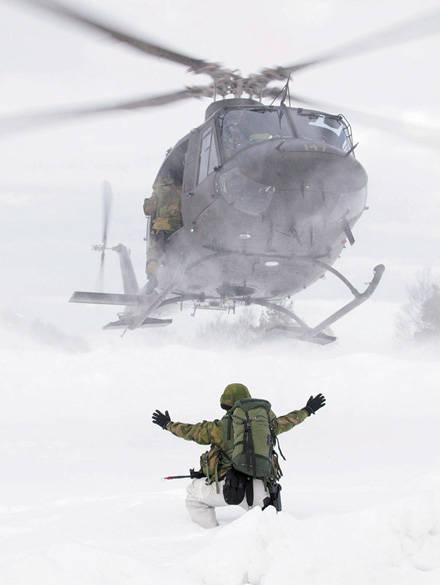 Strengthening the role of intelligence
Strengthening the role of intelligenceIn order to conduct an effective special operation, comprehensive intelligence support and the availability of a reliable integrated intelligence structure are key to success.
The need for timely, accurate and reliable information and the ability to verify intelligence is crucial for the planning and implementation of special intelligence, military assistance or offensive operations against rebel groups or personnel of the enemy. The lessons learned from operations in Afghanistan show that the Norwegian special forces need to strengthen and further develop the organization of intelligence. Special attention should be focused on the development of its own intelligence capabilities, radio and radio intelligence and aerospace intelligence, which are very important for a successful fight against the rebels. The Norwegian military should step up cooperation with strategic intelligence services and continue to actively use strategic intelligence equipment.
Interaction
When conducting counter-insurgency operations in a foreign territory, it is very important to work closely with the security forces of the host country, organizing cooperation not only with the armed forces, but also with the security forces of other ministries, such as the Ministry of the Interior. Often, the main purpose of a special forces may be to train these units and help develop their capabilities so that they can ultimately use their own potential to ensure national security. It is logical that, at the initial stage, the task of providing military assistance may consist in conducting joint operations with national security forces with a gradual expansion of their duties.
In 2007, the Norwegian special forces launched an important project to train the Afghan police in the Kabul region, which may have had a much more positive effect than doing special intelligence or offensive operations. Some critics argue that nation-building should not be organized and carried out by the military. However, at that time there were no other organizations or countries that were willing or able to perform this task. Current operations trends in Iraq and Afghanistan show that military units in future operations should still be able to perform the tasks of nation-building, which are usually performed by the State Department and the Ministry of Justice. Thus, the Norwegian Ministry of Defense should continue to provide military assistance in training and cooperation with their special forces and tactical units to assist in the preparation of their tasks.
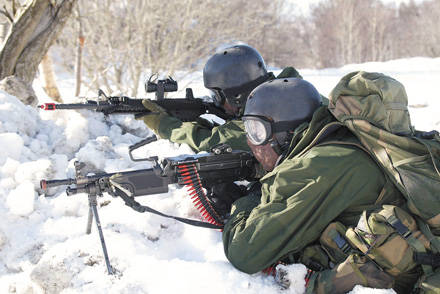 The participation of special forces in multinational counter-insurgency operations is just one of many ways to solve problems that are under the authority of the commander of multinational forces. Full cooperation with conventional units, air assets, local forces and civilian institutions is crucial for constructive action and progress during the campaign. Therefore, the Norwegian special forces must master the skills of the whole range of cooperation and coordination.
The participation of special forces in multinational counter-insurgency operations is just one of many ways to solve problems that are under the authority of the commander of multinational forces. Full cooperation with conventional units, air assets, local forces and civilian institutions is crucial for constructive action and progress during the campaign. Therefore, the Norwegian special forces must master the skills of the whole range of cooperation and coordination.Future Tactical Task Force
At present, the Norwegian special forces consist of units of the army, navy and air force. In the past ten years, Norway has radically changed the priority towards the development and application of NORSOF and increased the capabilities of special forces. NATO lacks strength; coalition forces also lack air assets of direct support during special operations. On this basis, Norway has established a helicopter squadron, whose personnel has been trained and equipped to support the conduct of special operations abroad.
However, this unit has not yet become part of the Norwegian task force for special operations in Afghanistan. The operational needs of action in Afghanistan require the participation of a special forces air force unit with valuable capabilities. The work of this unit should strengthen the capabilities of the Norwegian special forces in solving an even wider range of tasks. As a result, the helicopter squadron should acquire extensive experience in conducting complex special operations abroad. The integrated terminal of special-purpose air controllers usually works with F-16 fighter squadrons, since their equipment is fully compatible. In this regard, squadrons of the F-16 Norwegian Air Force can be deployed to participate in special operations of the national task force. The use of F-16 will not only increase the fire capabilities in the offensive operation, but also expand the capabilities of the aerial reconnaissance that is required in counterinsurgency operations.
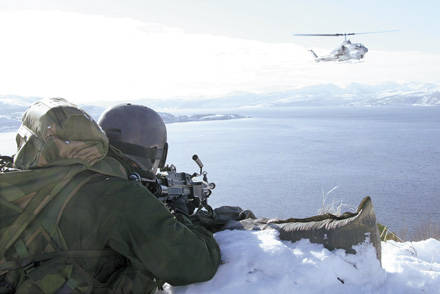 In the last decade, the Norwegian special forces have evolved from strategic forces, which were previously aimed at solving domestic counter-terrorism tasks and ensuring national security, into forces that carry out complex operations abroad. The Norwegian politicians and the Ministry of Defense have increased resources and increased the priority of the special forces, which has led to their increased capabilities. The comprehensive lesson learned over the past seven years of participation in operations in Afghanistan has proven to be very constructive for the development of the entire Norwegian special forces.
In the last decade, the Norwegian special forces have evolved from strategic forces, which were previously aimed at solving domestic counter-terrorism tasks and ensuring national security, into forces that carry out complex operations abroad. The Norwegian politicians and the Ministry of Defense have increased resources and increased the priority of the special forces, which has led to their increased capabilities. The comprehensive lesson learned over the past seven years of participation in operations in Afghanistan has proven to be very constructive for the development of the entire Norwegian special forces.During the special operations in Afghanistan, the objectives were achieved, which allowed the military leadership of the coalition forces to give positive feedback on the activities of NORSOF and recognize their participation in the operation as very tangible and important. Norwegian political leaders have said that special forces will remain one of the most significant forces that Norway intends to send to participate in the multinational operations of the future. In the medium term, Norway will continue to conduct operations to support the Afghan government, taking part in the ISAF mission. In addition, it is important for the Norwegian special forces to maintain and improve their capabilities and to further develop new useful concepts that will be crucial for achieving the strategic and operational goals in the future complex of counterterrorism operations.
Information